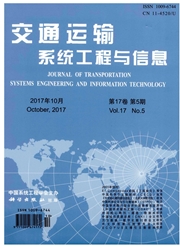

 中文摘要:
中文摘要:
现有关于交通信息对出行决策影响的研究大多基于ATIS提供的交通信息,而探讨通过非正式的社交渠道即朋友圈获得的交通信息对出行决策的影响尚不多见.通过进行可控的交通行为实验,探讨了朋友圈的交通信息交互对个体出行决策行为的影响.实验结果表明:朋友圈交通信息交互率为33.3%时,系统整体达到最优;信息交互率为75%时,达到用户最优;当网络由系统最优移近用户最优时,人均出行时间与成本有所增加;相比用户最优,系统最优时的出发时刻调整情况比较分散,而路径选择情况则相对集中.
 英文摘要:
英文摘要:
Many existing studies focus on the effects of traffic information from ATIS on travel choices. Research on the effect of friends' travel information on people' s travel choice is uncommon, yet needed. In this paper, behavioral experiments are conducted to discuss what the effects of infoimation interaction with friends can bring on individual travel decision behavior. The experimental results concluded that when the~ rate of friends' information interaction reaches 33. 3%, the whole system is at an optimal level. Furthermore, users reach an optimmn when the rate of friends' travel information interaction is 75%. The average time and cost per person is increasing when the whole system optimum transfers to the user optimum. Moreover, adjustments of departure time at the system optimum are more dispersed than at the user optimum, while travel choice changes are more concentrated.
 同期刊论文项目
同期刊论文项目
 同项目期刊论文
同项目期刊论文
 期刊信息
期刊信息
